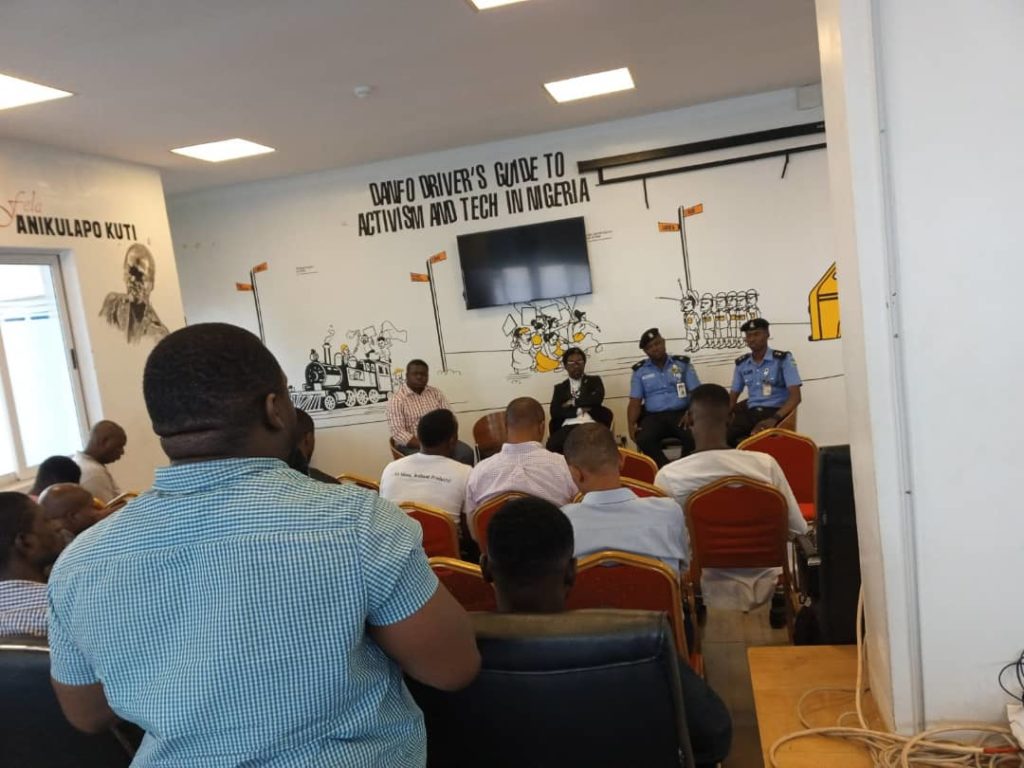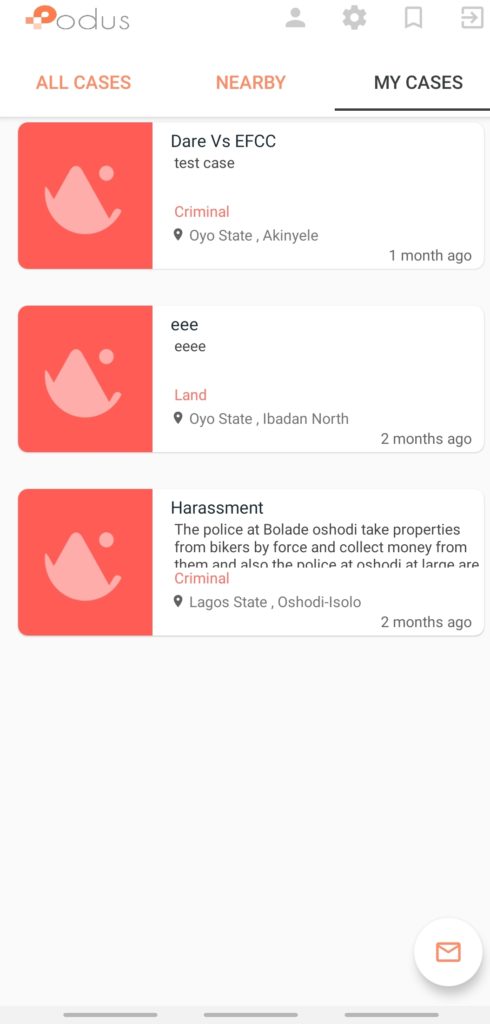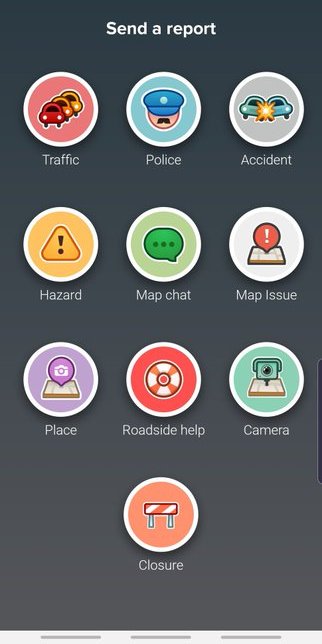In well-ironed blue uniforms and IDs clipped to their breast pockets, police officers N. I. Albert and A. A. Umar look distinct from many of their colleagues notorious for kidnapping, maiming and robbing innocent Nigerians. But as another tumultuous week of brutality against young techies wound down, both men were invited from Force headquarters Abuja by the non-profit organisation Citizen Gavel for a “strategic meet-up” at the Civic Hive in Lagos. Could they possibly justify the spate of illegal shakedowns threatening Nigeria’s coveted yet fragile multibillion-dollar sector?
At least three incidents in the last two weeks rocked social media with renewed urgency for dismantling SARS and police reform in general. At the Gavel meet-up which social commentator Segun Awosanya convened, participants told their own distressing stories of harassment. There was Kunle Olukunle a cryptocurrency trader, who says his run-in with the Police in 2015 has left him consistently fearful of men in black, even though he always has complete records of his legitimate dealings. Segun, a Lagos-based photographer, is rehabilitating his dread of cops with a new obsession: investigating every SARS malfeasance route cum extortion joint from Ojuelegba to Oshodi. Officer Umar, reacting calmly to the sea of frustrations, gave a decent perspective on the Complaint Response Unit’s reporting and tracking process. But David Oluranti who heads the legal team at Flutterwave wasn’t satisfied. “A complaint unit is reactionary; the person who has died has died”, Oluranti said in an aching voice typical of the mood in the room.

A problem so far defined as the unwarranted hounding of young Nigerians in the technology-entrepreneurship ecosystem will require solutions integrating technology. While a fundraiser for a class action lawsuit against the Police gathers momentum, industry influencers are thinking up pragmatic palliatives to make reporting and escalation easier and quicker. One such medium is Podus.ng, a web service launched by Gavel in August for connecting citizens who are in danger of police harassment to lawyers around the country. About 150 lawyers are available on the app catering to urgent distress calls from 15 states, according to Nelson Olanipekun who leads Citizen Gavel. “In the event of complaints from other states, we are able to leverage law school networks to reach other lawyers who can be of aid. And the service will be free of charge,” he told me after the meetup. Before he had to draw attention to the harassment of his Paystack colleague, Steve Amaza had been urging followers to adopt Waze, a Google-owned GPS navigation app that lets users get notified by other users when a police block or accident has occurred on their route.



But Podus and Waze are not the institutionalized preventive measures Nigerians like Oluranti cry out for. You cannot report a case on the app if you have been disarmed of your phone by a rogue officer. It is, at best, an alternative eye-witness reporting mechanism made necessary by the absence of accountability facilities like body cameras for officers on duty. And it is contentious whether Waze should show police checkpoints.
In reality, police brutality in the country benefits from a combination of factors: the organisation is grossly underfunded and fundamentally relies on colonial-era legislation for modern functions. As officer Albert explained, recruitment is not under the control of the police in a way that would enable it assess intending officers on competence and character: “No police is trained to be wicked”.
Imams, pastors and other guarantors need to stop vouching for people of questionable character because the force cannot be a rehabilitation center.
Solving these deep-seated challenges is crucial for campaigns like #EndSARS and #StopRobbingUs to bear their desired goals. Awosanya – also called Segalink, the name of his popular twitter handle – has arguably been the most visible leader in the charge against SARS online and offline, interfacing severally with past and present senior officers of the force. After the recent abduction of a bank’s IT staffer by rogue officers, he has dialed his activism up a notch by calling for citizens to devise means for apprehending errant cops (A variant of this proposal by Prosper Otemuyiwa, co-founder of household cleaning start-up Eden Life, challenges a security start-up to engineer a CIA-level of coordination and implementation).
We are pushing for the Inspector General of Police to put a protocol in place to mandate all police to wear uniforms”
Segun Awosanya
Segalink’s team of enthusiasts at Social Intervention Advocacy Foundation (SIAF) is pledging to follow up on brutality reports and attend orderly room trials held by police authorities to sanction rogue officers. Six officers caught in different cases have been paraded. They have made statements and cross-examinations have followed, with a report on the proceedings to be made public in the coming days. Should they be dismissed from the force, further prosecution will follow for their respective crimes ranging from robbery to kidnapping.
Catching culprits, returning stolen money to victims and dismissing officers are commendable wins. But passing the Police Reform Bill and a Police Trust Fund Bill are the institutional solutions atop the wishlist of advocates of the campaign. Engagements are underway to press the Femi Gbajabiamila-led House of Representatives to concur to the Police Reform Bill passed by the Senate of the 8th National Assembly, Segalink confirmed to TechCabal. Also “we are pushing for the Inspector General of Police to put a protocol in place to mandate all Police to wear uniforms”, ensuring that officers of all units – whether SARS, anti-cultism, rapid response squad or traffic control – have identifiable material on their person while on duty. Achieving officer accountability is the bulls-eye.
Not everyone who uses a smartphone, a tablet or a laptop is in tech, but you’re definitely a target for them anyway”
Odunayo Eweniyi
Tech entrepreneurs are upbeat about the chances of success. “We’re engaging the challenge on all fronts, speaking to stakeholders in the government who can help us make a change,” Odunayo Eweniyi of Piggyvest, who co-signed the press release triggering #StopRobbingUs, tells TechCabal.
“We are engaging young people on social media to continue to rally against the kidnapping and extortion of people just trying to make a living as well as seeking legal redress for the people who these crimes have already been committed against.”
Eweniyi insists this is a duty everyone should sign onto because “not everyone who uses a smartphone, a tablet or a laptop is in tech, but you’re definitely a target for them anyway. We need to rally together and fight against it. Rogue SARS officers and rogue police officers are a danger to all of us”.
Nigeria remains in a period of economic recovery. With foreign investors looking more appealingly towards Kigali, Nairobi and Accra, this feels like a pivotal opportunity for policymakers to fully embrace the detrimental impact of police lawlessness on a sector with huge economic potential. Cleaning up the rot does not have to keep depending on the courage of those who call emergency numbers or tweet out loud after the fact. And on fellow citizens who immediately amplify.





















